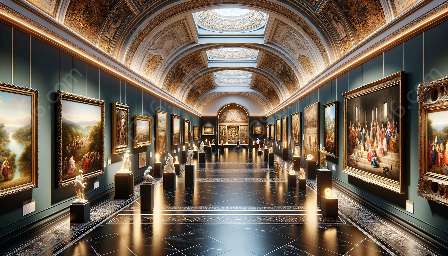Art theory is informed by a rich tapestry of philosophical inquiries that have shaped the way we perceive and interpret artistic expression throughout history. The intersection of art theory with art criticism, theory in history, and art history provides a comprehensive understanding of the intricate relationship between artistic creation and human experience. In this exploration, we will delve into the philosophical underpinnings of art theory and its impact on artistic interpretation, aesthetic judgment, and the cultural significance of art.
The Role of Philosophy in Art Theory
Philosophical foundations form the bedrock upon which art theory is constructed. From ancient inquiries into beauty and representation to contemporary explorations of postmodernism and deconstruction, philosophical perspectives have influenced the conceptualization, creation, and appreciation of art. The philosophy of art seeks to address fundamental questions about the nature of creativity, the relationship between art and reality, and the subjective experience of beauty and meaning.
Art Theory and Aesthetics
Aesthetics, a branch of philosophy, plays a pivotal role in art theory by examining the nature of sensory perception and the interpretation of beauty. The philosophical study of aesthetics informs our understanding of the principles that govern artistic creation, such as harmony, proportion, and emotional expression. Art theory integrates these aesthetic concepts to analyze and evaluate the visual, auditory, and performative aspects of art, thereby enriching our appreciation of artistic forms and styles.
Art Criticism and Theory in History
Art criticism, rooted in philosophical inquiry, provides a critical framework for evaluating and contextualizing artistic works within their historical and cultural milieu. By drawing from philosophical concepts of expression, representation, and intentionality, art criticism and theory in history engage with the philosophical dimensions of art theory, offering nuanced interpretations and critiques of artistic movements, styles, and individual works.
Art History and Cultural Significance
Art history serves as a conduit for understanding the cultural, social, and political significance of art, reflecting the philosophical shifts and intellectual paradigms that have shaped artistic production and reception. By examining art within specific historical epochs and cultural contexts, art history elucidates the ways in which philosophical ideas have influenced the creation, reception, and interpretation of art, underscoring the dynamic interplay between philosophical thought and artistic expression.
Enriching Our Understanding of Art Theory
As we navigate the philosophical foundations of art theory, we uncover the intricate web of ideas, values, and beliefs that inform artistic practice and reception. By embracing the symbiotic relationship between philosophy, art theory, art criticism, and art history, we gain a comprehensive understanding of art as a multifaceted discourse that engages with the complexities of human existence, perception, and creativity.

